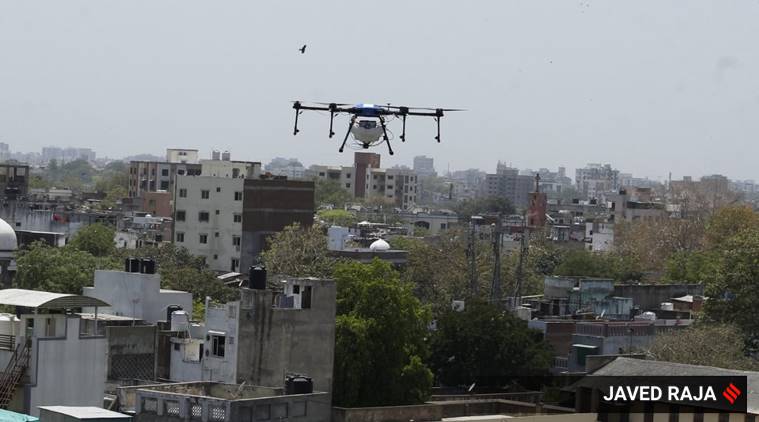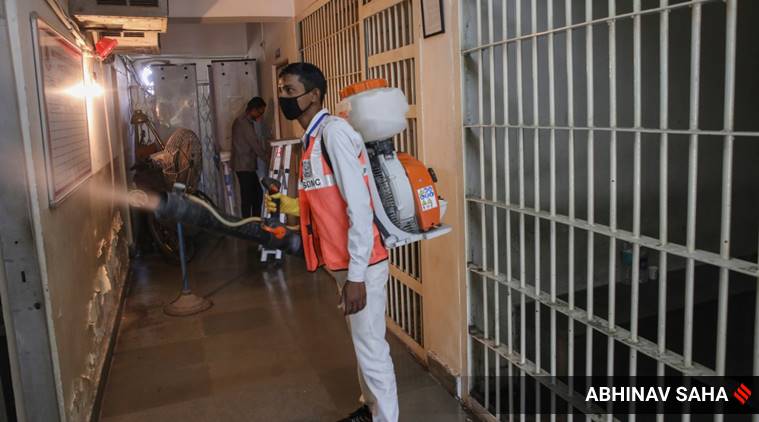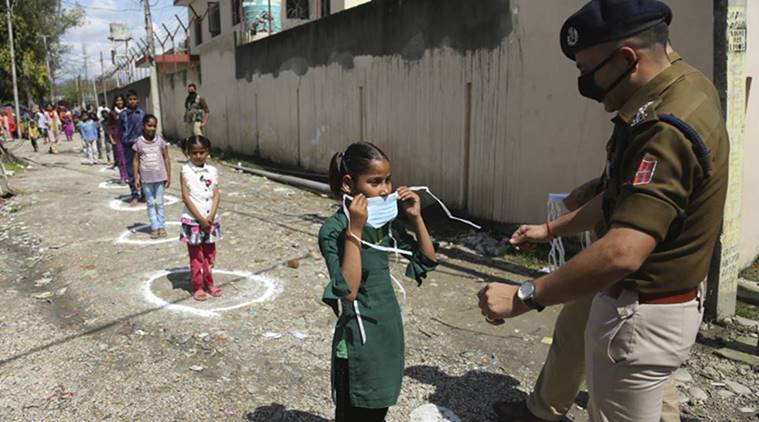 Drones spray disinfectant on quarantine sites in Ahmedabad. (Express photo by Javed Raja)
Drones spray disinfectant on quarantine sites in Ahmedabad. (Express photo by Javed Raja)
As the last week of the three-week lockdown begins, amid indications that some restrictions may continue post-April 14, the government is preparing to massively scale up testing for COVID-19 over the next few days. Sources said the test results during this “make-or-break week” will be a deciding factor in determining whether the lockdown continues or not.
With 508 new cases being confirmed in the last 24 hours, the total number of cases detected across the country touched 4,789 on Tuesday. While 124 people have died so far, 353 have been discharged.
Live Updates: India’s COVID-19 cases rise to 5,194 on Wednesday; 149 dead
“This week, you can say, is the make-or-break week so far as the future course of the epidemic in India is concerned, whether we continue with the lockdown or not. The criticism has been that we did not test enough, but we have always maintained that if it (infection) was really happening that much, the death toll would not be so low; also, influenza-like illnesses across the country have remained flat. But to test that hypothesis, we need to test. That is what we will do this week when we hope to get a definitive idea about the course of the disease,” said a government source.
The testing protocol is likely to remain the same — symptomatic people with travel or contact history, health workers with symptoms, all hospitalised patients with severe acute respiratory illness (fever, cough etc), and asymptomatic direct and high-risk contacts of a confirmed patient (once between days 5 and 14 of having come in contact).
With the ICMR issuing an advisory for the use of rapid antibody tests in “areas reporting clusters (containment zone) and in large migration gatherings/ evacuees centres”, the serological tests are set to be conducted on a wider scale.
 MCD Health Worker sanitize in Delhi’s Ohkla industrial area. Express photo by Abhinav Saha
MCD Health Worker sanitize in Delhi’s Ohkla industrial area. Express photo by Abhinav Saha
With 12,584 (swab) tests being done in the last 24 hours, the total number of samples tested has touched 1,14,015.
“The idea is to double the number of tests every three-four days and reach about 40,000 daily. The private labs obviously have better mobility and reach than us because they are making money,” said the source.
Two high throughput testing machines have been pressed into service in Bhubaneswar and Noida, each with a capacity to test 1,300-1,400 samples daily. Twelve such machines have been ordered from Roche, and are expected to be delivered in about three weeks.
There are also the TB testing machines, CBNAAT and TRUNAT, that have been pressed into service for COVID-19.
Environment Secretary C K Mishra, who heads the empowered group on hospitals, testing facilities etc, said: “The government is making every effort to ramp up testing and also working with states to see that it is delivered.”
Meanwhile, the Health Ministry said the cluster containment strategy in hotspots like Agra, Mumbai, Pathanamthitta and Bhilwara has started to show results.
In addition, in a bid to streamline care of patients, the ministry issued directions for categorisation of designated facilities into three groups — COVID care centres, COVID health centres and dedicated COVID hospitals.
 A police officer distributes masks to children of migrant daily wage laborers during lockdown in Jammu
A police officer distributes masks to children of migrant daily wage laborers during lockdown in Jammu
According to the document prepared by the Health Ministry’s emergency medical response division, the COVID care centres are makeshift facilities for “mild”, “very mild”, or suspected cases, and may be set up in hostels, hotels, schools, stadiums, lodges.
The COVID health centres are for “moderate” cases, and should either be a full hospital or a separate block in a hospital with preferably separate entry/ exit/ zoning.
The dedicated COVID hospitals are primarily for “severe” cases, and should either be a full hospital or a separate block in a hospital with preferably separate entry/ exit, fully equipped ICUs, ventilators and beds with assured oxygen support.
This article first appeared in the print edition under the title ‘As case count nears 5000, Govt plans big testing push in make-or-break week’.